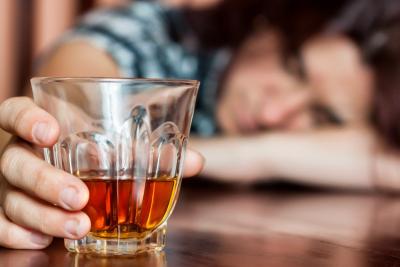

by Alanna Ketler, Collective Evolution
Alcoholism is one of the most common addictions of our time — and one of the most dangerous. According to the World Health Organization, over 140 million people across the globe suffer from this disease. Alcohol related illnesses and disease cause over 80,000 deaths in the U.S. each year and around 3 million worldwide, making alcoholism one of the top preventable causes of death, with about 6 percent of all deaths attributable to this disease.
One of the biggest challenges with alcohol today is that it is so widely accepted and even strongly encouraged within our society. Everywhere you look there are advertisements for alcohol, liquor stores, cocktail hours, and social “get togethers,” all of which are meant to convince you that alcohol is a necessary and normal part of our culture, and that drinking it will make your life more fun and exciting. What they fail to articulate are the negative effects alcohol can have on your life and the lives of people around you.
There are many different treatments available for those suffering with alcoholism, with the most well-known being Alcoholics Anonymous, a religion-based 12-Step abstinence program that has helped many people by connecting them to something beyond themselves — a higher purpose, God, the Universe — whatever is meaningful to them. While this has been effective for many people in the past, it doesn’t work for everyone, and many still suffer relapses.
But a study conducted at the University of New Mexico has found that psilocybin, the active hallucinogenic compound found in “magic mushrooms,” can effectively, and lastingly, treat this disease. Interestingly enough, this isn’t the first time that the use of psychedelics as a treatment for alcoholism has been considered. About 20 years after co-founding Alcoholics Anonymous, Bill Wilson said that LSD could help “cynical alcoholics” achieve a “spiritual awakening” to help start their path to recovery.
The Study
Included in the team of researchers was Dr. Rick Strassman, author of DMT: The Spirit Molecule. The study aimed to establish a foundation of research to encourage other scientists to recognize and explore psilocybin as a legitimate treatment for alcohol addiction.
“Although recent studies have investigated the effects of psilocybin in various populations,” the researchers write, “there have been no studies on the efficacy of psilocybin for alcohol dependence.”
While only conducted on 10 participants, this proof-of-concept study was able to show that the drug can effectively treat alcohol dependence, paving the way for further studies of this nature.
The first four weeks of therapy did not include psilocybin use, consisting entirely of traditional therapy. Unsurprisingly, participants’ abstinence did not significantly increase. Following the administration of psilocybin, however, abstinence from alcohol increased significantly, and this improvement held steady even nine months after treatment.
Researchers also discovered there was a direct relationship between dosage and results: “Intensity of effects in the first psilocybin session strongly predicted change in drinking during weeks 5–8,” they explained. More intense trips were not only more effective, but also resulted in greater improvements in cravings and other positive metrics during week five.
The results are promising, and one can only hope that this stimulates further dialogue about psychedelics in the scientific community and leads to more, and bigger, studies.
Prior Research on Psilocybin and Addiction
Recent studies that were conducted by Matthew Johnson at Johns Hopkins University have been able to successfully show that psilocybin can combat another hugely addictive and life-threatening substance: tobacco. Published in Psychopharmacology, the study saw incredible results in helping people to quit smoking.
“The rates of quitting were so high, twice as high as what you typically see with the gold standard medication,” he told Bloomberg.
Interestingly enough, a follow-up study showed how the nature of the experience significantly impacted the results. At six months after treatment, those who rated their experiences with psilocybin as more “mystical” were much more likely to remain tobacco free. “No significant differences in general intensity of drug effects were found between groups,” they noted, “suggesting that mystical-type subjective effects, rather than overall intensity of drug effects, were responsible for smoking cessation.”
The Future of Psychedelic Research
Although these studies certainly showed promising results for addiction treatment, they were still limited by poor funding. Psilocybin is still considered a schedule 1 substance under the Controlled Substances Act and therefore testing of any kind with it is challenging. Proper funding would enable better, more thorough research, and a larger study would lend credibility to using psychedelics in this way. Hopefully, increased awareness will lead to better funding and more lenient laws, allowing for everyone to benefit from psilocybin’s healing potential.
Much Love

